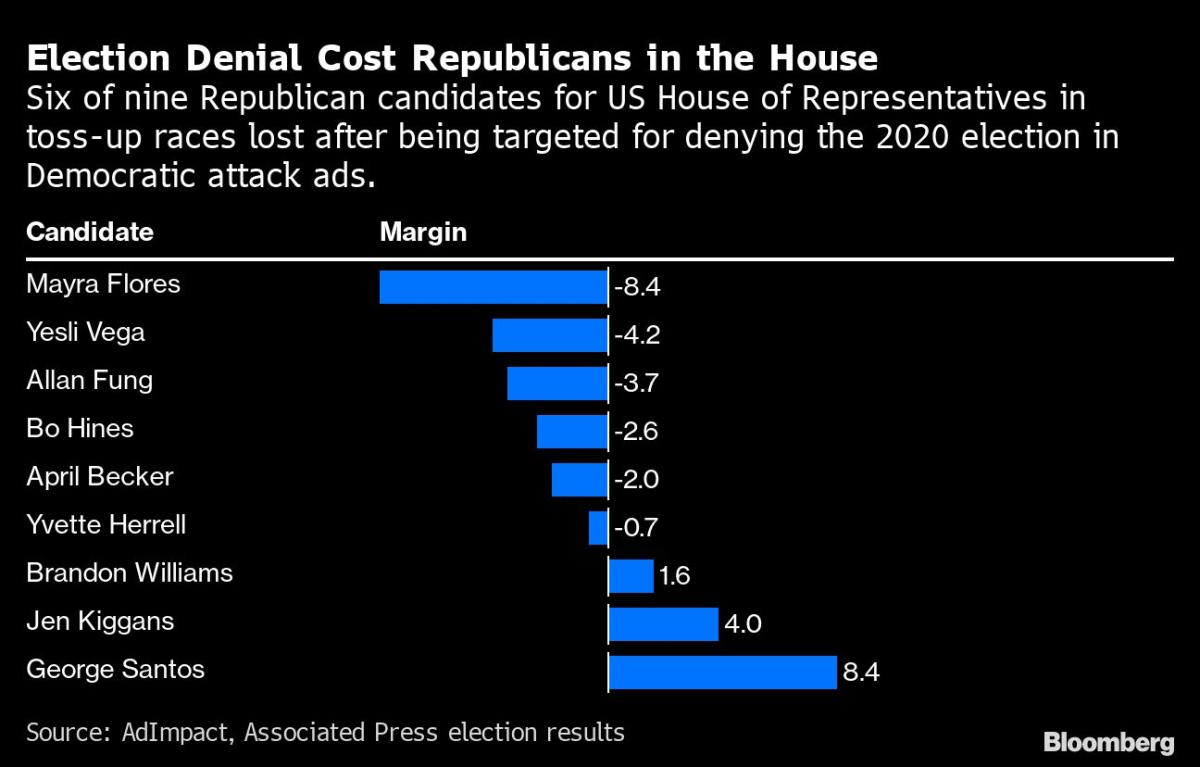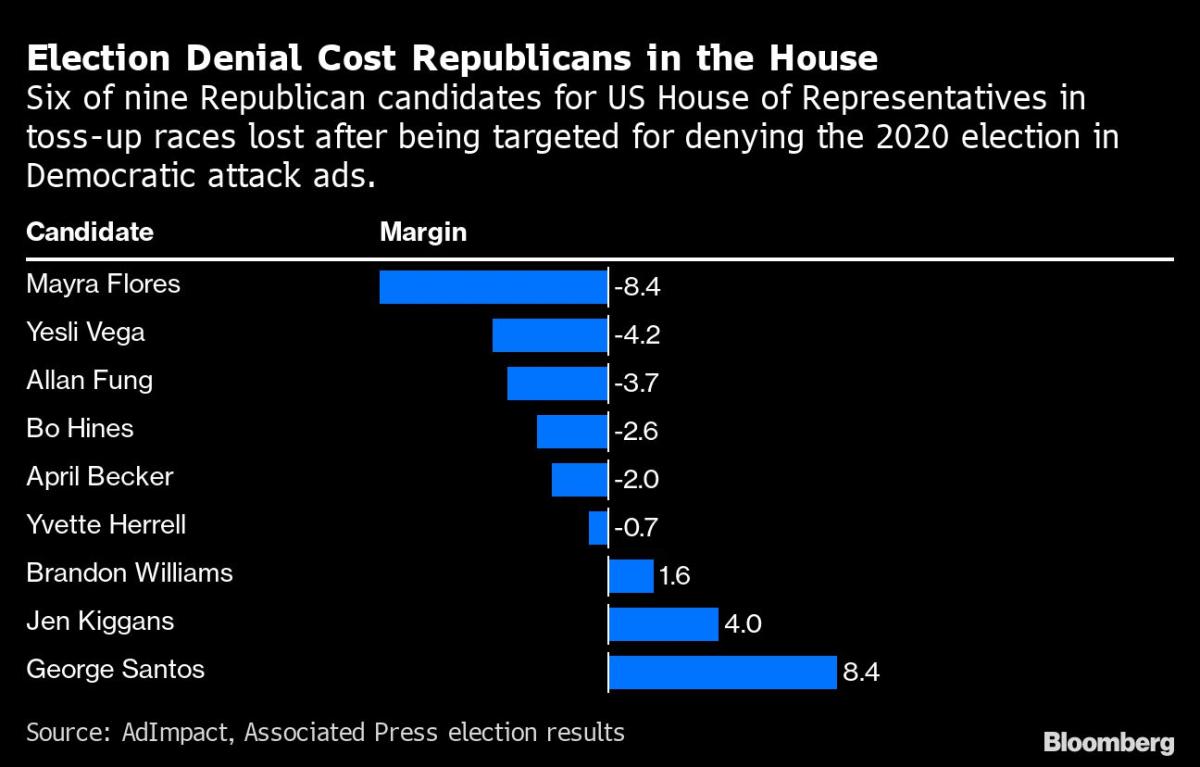
(Bloomberg) — Democrats took on a risky strategy in a handful of House races, targeting their opponents for backing Donald Trump’s false claims of 2020 voter fraud instead of safer, poll-tested issues like abortion rights or the economy. And in two-thirds of the cases, it worked, narrowing the GOP majority for the remainder of President Joe Biden’s term.
Most Read from Bloomberg
In the final weeks of the midterm cycle, Democratic campaigns and outside groups homed in on nine candidates with ads showing footage of the Jan. 6 insurrection at the US Capitol and attacking them for supporting Donald Trump’s baseless claims about the 2020 election in some way.
Six of those candidates lost, limiting the margin of the new Republican majority to 218 to 210 Democrats, with a half-dozen races still outstanding.
The little-noticed strategy piggybacked on larger efforts to criticize election deniers running for governor and secretary of state. Biden elevated the protection of democracy as an issue in a speech just days before Election Day.
At the time, Democratic strategists criticized the speech as ineffectual when voters were citing inflation and the economy as a top issue.
But the attacks seem to have worked. Overall, candidates who voiced skepticism about the 2020 presidential results were roundly defeated from New York to Arizona in Senate, House and state races, even when anti-Trump Republicans won.
The losing House candidates who were targeted included Representatives Yvette Herrell in New Mexico and Mayra Flores in Texas, as well as challengers April Becker in Nevada, Bo Hines in North Carolina, Allan Fung in Rhode Island and Yesli Vega in Virginia. All were in races rated “toss-up” by the Cook Political Report.
A similar ad campaign contributed to Democrats maintaining control of the Senate. Senator Catherine Cortez Masto ran multiple ads in the final weeks of the campaign targeting Republican candidate Adam Laxalt for his efforts to try to overturn Trump’s loss in Nevada, helping her eke out a narrow win in the state that gave Democrats their 50th seat, securing control.
Sarah Longwell, a Republican political consultant who ran anti-election denier ads through the Republican Accountability Project, said they were effective because swing voters were turned off by extreme candidates.
In focus groups over the last year, Longwell said swing voters mentioned issues like inflation, crime or the coronavirus pandemic as top concerns, but when asked why they disliked specific Republican candidates, they would often mention abortion rights and the Jan. 6 attacks among their reasons.
Similar ads also ran in districts that leaned toward Republicans or Democrats, including several ads against Derrick Van Orden, a House candidate in Wisconsin who was outside the Capitol on Jan. 6, but won his seat anyway.
Along with the losses of election-denying gubernatorial candidates in the critical 2024 states of Arizona, Michigan, Pennsylvania and Wisconsin and secretary of state candidates in Arizona, Michigan, Nevada, Minnesota and New Mexico, the fumbled House races gave added weight to concerns among Republicans about Donald Trump’s drag on the party as he launched his third presidential run on Tuesday.
The nine targeted Republican candidates faced ads featuring footage of the Jan. 6 attack on the Capitol alongside comments in which the candidates said rioters were being “persecuted,” claimed the 2020 election was “rigged and stolen” or spread conspiracy theories.
Many drew on tropes more typical of Republican campaign ads that go after opponents as being soft on crime.
One ad, from Democratic Representative Abigail Spanberger in Virginia, featured Republican Police Chief Chris Jenkins of Culpeper criticizing Vega for calling the FBI “corrupt” and “disgusting” in a fundraising email and saying in a candidate forum that the Jan. 6 rioters were being “persecuted” and “shamed.”
“That’s just wrong,” he said.
Other ads said Hines “sides with rioters over police” and Flores “even blamed the police for the attack on the Capitol that left five police officers dead.”
The ads were just a sliver of the overall spending by pro-Democratic groups, which mostly zeroed in on issues such as abortion, especially where the candidate favored bans with no exceptions for rape, incest or the life of the mother. The spending also paled in comparison to the $46 million spent attacking election deniers running for secretary of state, which often is the position to administer voting and ballot-counting.
Longwell said election denial wasn’t just a problem in isolation. The kinds of candidates who used it to win Trump’s endorsement or get through a Republican primary also tended to hold other views that swing voters found problematic, she said.
“There was a high degree of overlap between people who denied the 2020 election and also said a lot of other crazy things,” she said.
Hines, for example, faced widespread criticism when he said victims of rape and incest should only get an abortion if approved by a “community-level review process,” while Vega drew national attention for suggesting it’s harder for women to get pregnant from a rape. The ads often paired these positions on abortion with election denial to say the candidates were too “extreme.”
The ads didn’t necessarily target the most extreme election deniers. Fung, the former mayor of Cranston, Rhode Island, ran as a New England moderate, but the ads tagged him as an extremist for not condemning Trump. Herrell was attacked for voting with other Republicans against a move to strip Representative Marjorie Taylor Greene of her committee assignments over her calling for the execution of top Democrats.
Three of the Republican candidates targeted by the ads won anyway: George Santos and Brandon Williams and in New York and Jen Kiggans in Virginia.
Santos, who was at Trump’s rally on the Ellipse that preceded the Capitol attack, was caught on camera saying he “cut a nice check” to a law firm to get insurrectionists out of jail. Williams repeatedly declined to blame Trump for the Jan. 6 attack until a Nov. 3 debate. Kiggans raised doubts about elections systems, backed an audit of the Virginia election and declined to say if Biden won fairly.
Most Read from Bloomberg Businessweek
©2022 Bloomberg L.P.




